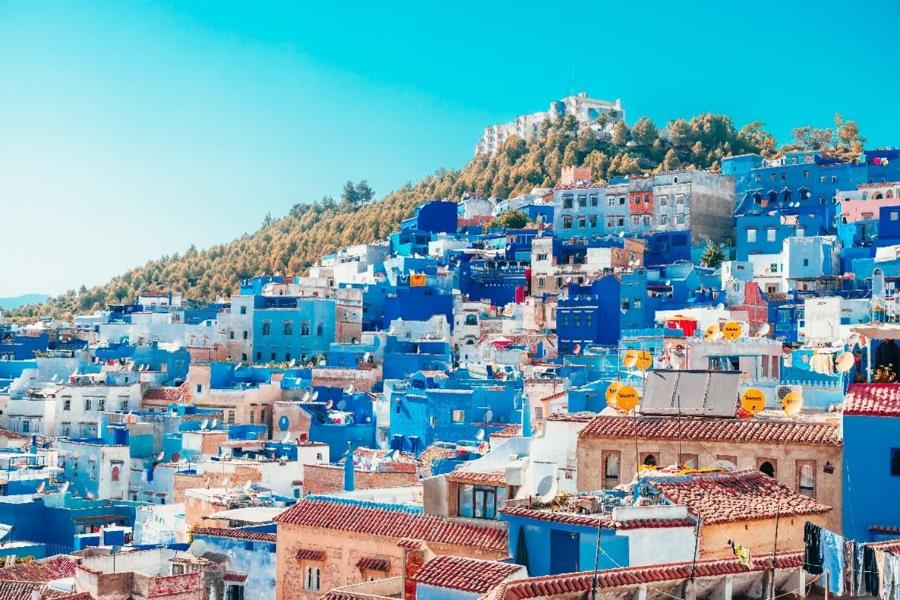
- The European Investment Bank (EIB) and the City Climate Finance Gap Fund are supporting the municipality of Chefchaouen in optimising municipal waste management services.
- The technical assistance provided by the Gap Fund will lay the groundwork for a pre-feasibility study to assess, optimise and organise waste management in line with the city’s master plan.
- This project will help to achieve local and national environmental and climate goals, while improving people’s quality of life.
On Wednesday, 12 April, the European Investment Bank (EIB) announced new technical assistance for the municipality of Chefchaouen to be provided by the City Climate Finance Gap Fund to improve organic waste management, treatment and recovery services. The technical and financial support will first involve assessing the composition of household waste to estimate its economic potential. A technically and financially viable plan can then be developed to minimise the amount of organic waste sent to landfill and to maximise its profitability for the municipality. Finally, proposals will be made to improve organisational aspects of services, covering public, private and community waste management.
In the past, the management of municipal solid waste in Morocco was limited to waste disposal, with relatively low levels of waste recovery. As part of the city’s new master plan, Chefchaouen hopes to improve waste management services through this support by making new investments, strengthening the skills of the local workforce, and introducing sorting at source.
This technical and financial support will help to achieve local and national environmental goals by reducing greenhouse gas emissions and improving residents’ and visitors’ quality of life. This is a pilot project, which means it could be replicated in other municipalities in Morocco and the region.
“On behalf of the Chefchaouen municipal council, I would like to thank those at the Gap Fund and the EIB for the wide-ranging technical assistance to support climate-smart planning and investment in cities in developing and emerging countries. I would also like to thank the Local Authorities Department of the Moroccan Ministry of the Interior, with the support of the province of Chefchaouen, for the recent significant financial support to close the Chefchaouen landfill site and open a new landfill and recycling centre that meets current standards,” said Mohamed Sefiani, mayor of Chefchaouen. “In Chefchaouen, improving living standards and managing waste are matters of particular concern for decision-makers and residents alike, and a priority for the municipality. These are also some of the issues addressed in the municipal action plan. This waste management must cover various waste recovery processes in order to create decent, green jobs and fight climate change.”
Anna Barone, the EIB’s representative in Morocco, said: “It is essential to put urban waste to better use for the environment, the economy and public health, but also to foster the development of a circular economy that encourages innovation and creates value and jobs. As the climate bank, the EIB’s sustainability and performance goals go hand in hand. We are delighted to be helping the municipality of Chefchaouen by providing technical assistance through the Gap Fund, supporting the public and private sectors in the green transition locally and nationwide.”
The City Climate Finance Gap Fund, implemented by the EIB in partnership with GIZ, aims to close the climate finance gap in cities to achieve low-carbon and climate-resilient urbanisation.
This support also comes under the objectives of the Morocco-EU Green Partnership and is another concrete example of how international cooperation and local partnerships can help to improve people’s quality of life. It thus marks another step towards achieving the United Nations Sustainable Development Goals (SDGs) to promote effective and inclusive partnerships between governments, the private sector and civil society for sustainable development.
Background information
European Investment Bank
The EIB has been a key partner for Morocco for more than 40 years. It finances the development and implementation of important projects in vital sectors of the Moroccan economy such as business support, agriculture, water and sanitation, education, health, transport, urban development and renewable energy.
EIB Global is the EIB Group’s specialised arm devoted to increasing the impact of international partnerships and development finance. It is designed to foster strong, focused partnership within Team Europe, alongside fellow development finance institutions and civil society. EIB Global brings the Group closer to local people, companies and institutions through our offices around the world.
https://www.linkedin.com/company/eib-global/
City Climate Finance Gap Fund
The City Climate Finance Gap Fund (Gap Fund) is an initiative of the Federal Republic of Germany, Luxembourg and the Global Covenant of Mayors for Climate and Energy (GCoM), along with other key partners in the field of climate finance, such as C40 Cities, ICLEI and the Cities Climate Finance Leadership Alliance (CCFLA). With funding from Germany and Luxembourg, it is implemented by the European Investment Bank (EIB) in partnership with GIZ and the World Bank.
Created in September 2020, the Gap Fund is a global partnership that helps cities in developing countries plan, prioritise and deliver projects supporting climate mitigation and adaptation. It aims to unlock at least €4 billion in investment in climate-smart projects and urban innovations.